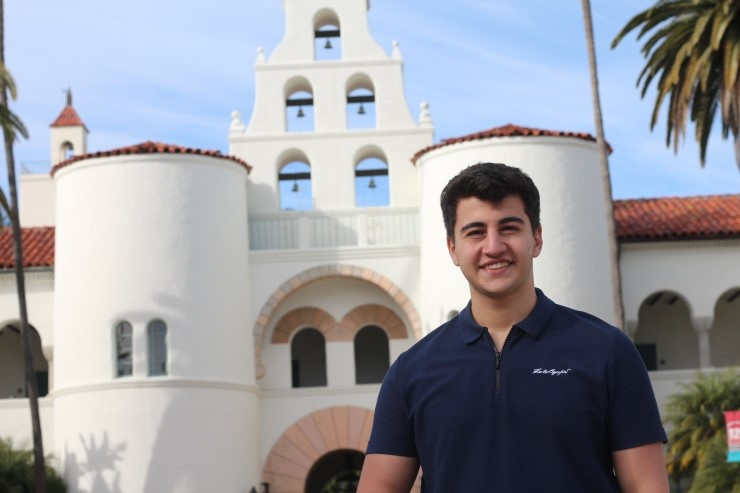FAQ on COVID-19 Precautions: What You've Wanted To Ask Experts
SDSU public health experts discuss what is safe and what isnt heading into the summer of coronavirus.

With state and county guidelines seemingly in constant flux, it can be hard to keep track of what’s right and wrong to do in public to minimize the risk posed by COVID-19. The SDSU News Team spoke with public health experts Hala Madanat and Eyal Oren about these common concerns and practices. Madanat is director of San Diego State University’s School of Public Health, a distinguished professor and health promotion and behavioral science expert. Oren is associate professor of epidemiology and an infectious diseases expert.
Here is some of their expert advice:
Trails, parks and lakes are becoming crowded again, but many don't wear masks as they pass by. What should we be careful about?
Madanat: While we recognize staying physically active is of great physical and mental health, it remains important to ensure that six feet physical distancing is maintained even in outdoor spaces. If individuals are getting close to you with no facial covering, try to cross to the other side and maintain that distance, or at least turn away.
Are public pools safe?
Oren: There is no evidence that COVID-19 can spread through water, and pool water in particular is heavily disinfected with chlorine or bromine. The danger is that the virus can spread from person to person, so it is important to avoid close contact in the pool or on the deck. It is difficult to wear a facial covering in an environment where you get wet so it is even more important to maintain proper physical distancing.
What behaviors have you observed that concern you most?
Madanat: There are two: The first is facial covering. Not everyone is wearing them or wearing them properly. The second is large group gatherings. It is extremely difficult to maintain adequate physical distancing at get-togethers in people’s homes or crowded settings.
Any tips to share on the best type of face coverings?
Oren: Cloth face coverings are particularly important in public settings where physical distancing measures are difficult. Facial coverings also help prevent us from touching our faces, and help reinforce physical distancing. Cloth face coverings will not prevent you from breathing in all respiratory droplets that carry COVID-19. But they will help to protect others from you if you happen to be infected.
Is dining outdoors at restaurants safe?
Madanat: It is often harder to meet the physical distancing requirements in restaurants especially if socializing with members outside of your household. There are clear guidelines for restaurants to follow that include no standing areas, distancing tables, ensuring service staff are wearing facial coverings and following proper hygiene. However, it is important to note that a significant number of recent clusters in San Diego County have been linked to restaurants and bars. Being outdoors likely reduces transmission risk compared to being indoors.
Why are we seeing an increase in coronavirus positive cases now and what can be done about it?
Oren: It is likely due to a mix of factors — many counties and states were quick to reopen due to economic, public and political pressures. Along with some mixed messaging around COVID-19, people have been feeling cooped up and want to get out and live their normal lives. It is likely that since Memorial Day, because of increased social interactions, we have also seen a higher rate of transmission of the virus from one person to another. At this time, it is more important than ever to maintain good hygiene, wear facial coverings and maintain proper physical distancing.
Can it spread by touching surfaces or groceries?
Oren: Because respiratory droplets from another person can land on a surface/object, it is possible that a person can get COVID-19 by touching a surface, including one that has the virus on it, and then touching their own face. However, the risk is considered low, given that the main transmission route is through breathing in respiratory droplets directly.
Can children play in the park if they wear face coverings?
Oren: The risks are certainly lower outside, as air is diluted and ultraviolet rays kill the virus. However, there is still some risk. Children may still expose or be exposed to others, who themselves may have had multiple exposures. Playground surfaces likely aren’t disinfected regularly, so it is recommended to take additional precautions in terms of hand-washing and face touching.
What is known about children and the virus?
Oren: Children can develop COVID-19, but most have either no symptoms or milder ones. While there is some evidence kids are less likely to catch the virus and to spread it, the evidence base at this time is not particularly strong.
It is also important to think about whether family members, relatives, or anyone else that’s older or has underlying medical conditions that might put that person at risk.
What can we expect if school resumes in August?
Oren: Going back to school may indeed result in clusters of infection, and school officials have been discussing long and hard how to best reopen schools safely, knowing the risks of keeping children home are also not negligible from a mental health standpoint, parental ability to work and so on.



